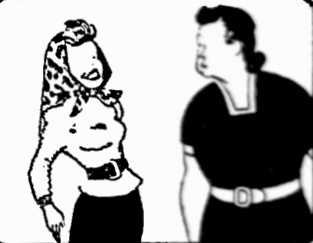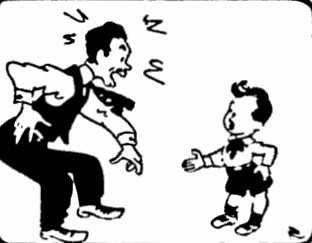The Pittsburgh Press (January 25, 1942)
CANDIDLY SPEAKING —
Americans have made ‘new’ language
By Maxine Garrison
The contributions of Americana have made virtually a new tongue of the English language. Our crisp colloquialisms, our shortcuts of description, our phrases that are bright and cutting as flames – these are indeed contribution to the mother tongue.
You may like them or not. The chances are you use a great many, even if you don’t consciously do so. They are here to stay, and each new edition of Webster has to make room for a few more.
There is another – and more doubtful – contribution we have made to oral communication.
That, my friends, is just plain, sloppy speech.
Our grammar is strictly from hunger. Our pronunciation is murr-der. And our enunciation simply isn’t.
After thoughtful consideration, almost anyone says:
Yeah, mebbe it’s strue. But ‘sall the fault of the schools. Them teachers. They don’t know nothing. My kids ain’t learned a thing about speakin’ since they started to school.
There’s truth in complaint
There is more truth in those words than this speaker realizes, but not in the way he or she thinks.
More of us are given instruction in grammar and proper speech at school. During the class hour, at least, we work very hard at it, forswearing double negatives, pronouncing final “ing’s” like mad, blushing at the mere thought of a “she don’t.”
The closing of the classroom door, alas, usually locks up good speech habits until the next period.
And the fault is not entirely, not even chiefly, on the teacher’s side.
Children learn to talk at home. That very first educational task of mastering language is the most difficult feat any of us ever masters. Starting with a sense of hearing, a certain talent for mimicry and an unused set of vocal equipment, we learn to talk. An adult would lie down and say “uncle” at the very thought of being called upon to perform a task in any way comparable.
Learn from parents
Most children therefore get their earliest and most thoroughly learned speech habits from their parents. It’s a sort of 24-hour-a-day instruction, Any teacher, however capable, has a terrific job trying to uproot those habits after the child is 6 years old. Given 15 or 20 children or more, she has just that many different sets of speech faults to try to erase. And every time the children go home they renew the old habits.
Most parents have at one time or another been exposed to good speech and correct grammar. They grow careless, or lazy, or think it doesn’t matter, until they are horrified at hearing their children speak badly.
There are no two ways about it. Parents who expect their children to speak well and correctly must first learn to watch their own tongues.

